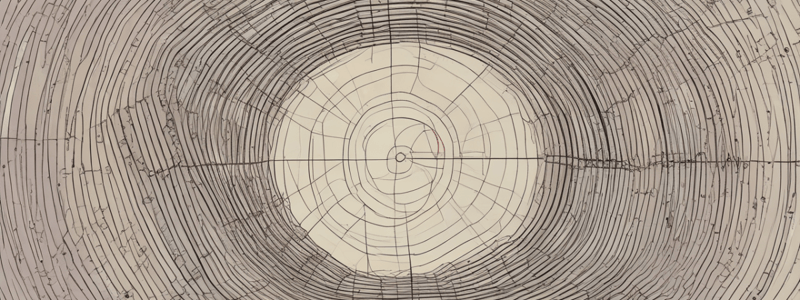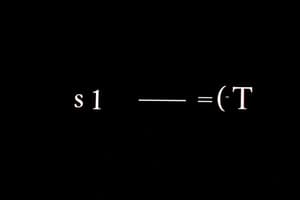Podcast
Questions and Answers
What is true about the relation R defined by nRm ⇔ n is a factor of m?
What is true about the relation R defined by nRm ⇔ n is a factor of m?
- R is symmetric but not transitive
- R is symmetric and transitive
- R is transitive but not reflexive
- R is reflexive but not symmetric (correct)
What is the minimum number of ordered pairs in a relation R on a finite set A having n elements?
What is the minimum number of ordered pairs in a relation R on a finite set A having n elements?
- Equal to n
- Less than n
- Less than or equal to n (correct)
- Greater than n
What is true about a relation R on a set A if (a, b) ∈ R and (b, a) ∈ R imply R = R^(-1)?
What is true about a relation R on a set A if (a, b) ∈ R and (b, a) ∈ R imply R = R^(-1)?
- R is symmetric and transitive
- R is reflexive and transitive
- R is an equivalence relation
- R is reflexive and symmetric (correct)
What is true about a relation R on a set A if nRp and mRp imply nRp?
What is true about a relation R on a set A if nRp and mRp imply nRp?
What is true about a relation R on a set A if (a, b) ∈ R implies (b, a) ∈ R?
What is true about a relation R on a set A if (a, b) ∈ R implies (b, a) ∈ R?
What is a requirement for a relation R on a set A to be reflexive?
What is a requirement for a relation R on a set A to be reflexive?
What can be said about the identity relation on a non-void set A?
What can be said about the identity relation on a non-void set A?
What is the condition for a relation R on a set A to be symmetric?
What is the condition for a relation R on a set A to be symmetric?
What is true about a reflexive relation on a set A?
What is true about a reflexive relation on a set A?
What is the property of the universal relation on a non-void set A?
What is the property of the universal relation on a non-void set A?
What is the property of the identity relation on a set A?
What is the property of the identity relation on a set A?
If a relation R on a set A is symmetric, then what can be said about the ordered pairs (a, b) and (b, a) in R?
If a relation R on a set A is symmetric, then what can be said about the ordered pairs (a, b) and (b, a) in R?
What is the condition for a relation R on a set A to be transitive?
What is the condition for a relation R on a set A to be transitive?
What is the diagonal line of A × A?
What is the diagonal line of A × A?
If R is a relation from A to B, which of the following is true about the domain of R?
If R is a relation from A to B, which of the following is true about the domain of R?
Let R be a relation from a set A to itself. If (a, b) ∈ R and (b, a) ∈ R imply (a, a) ∈ R, then what can be said about R?
Let R be a relation from a set A to itself. If (a, b) ∈ R and (b, a) ∈ R imply (a, a) ∈ R, then what can be said about R?
If R is the universal relation from A to B, which of the following is true about R?
If R is the universal relation from A to B, which of the following is true about R?
If a relation R on a set A is both symmetric and reflexive, then which of the following must be true?
If a relation R on a set A is both symmetric and reflexive, then which of the following must be true?
Let R be a relation from a set A to itself. If for every a in A, (a, a) ∈ R, then what can be said about R?
Let R be a relation from a set A to itself. If for every a in A, (a, a) ∈ R, then what can be said about R?
Let R be a relation from a set A to itself. If for every a, b in A, (a, b) ∈ R implies (b, a) ∈ R, then what can be said about R?
Let R be a relation from a set A to itself. If for every a, b in A, (a, b) ∈ R implies (b, a) ∈ R, then what can be said about R?
What can be said about a relation R on a set A if R is reflexive and R is its own inverse?
What can be said about a relation R on a set A if R is reflexive and R is its own inverse?
Let R be a relation on a set A such that R is symmetric and R is antisymmetric. What can be said about R?
Let R be a relation on a set A such that R is symmetric and R is antisymmetric. What can be said about R?
If R is a reflexive relation on a set A, then which of the following must be true?
If R is a reflexive relation on a set A, then which of the following must be true?
Let R be a relation on a set A such that R is the universal relation on A. What can be said about R?
Let R be a relation on a set A such that R is the universal relation on A. What can be said about R?
What can be said about the relation 'less than' in the set of natural numbers?
What can be said about the relation 'less than' in the set of natural numbers?
Which of the following relations is always symmetric?
Which of the following relations is always symmetric?
What is true about the inclusion of a subset in another, with reference to a universal set?
What is true about the inclusion of a subset in another, with reference to a universal set?
What is true about the relation R defined as {(2, 4), (4, 2), (4, 6), (6, 4)} on the set A = {2, 4, 6, 8}?
What is true about the relation R defined as {(2, 4), (4, 2), (4, 6), (6, 4)} on the set A = {2, 4, 6, 8}?
Which of the following statements is true about a reflexive relation R on a set A?
Which of the following statements is true about a reflexive relation R on a set A?
What is the condition for a relation R on a set A to be symmetric and antisymmetric?
What is the condition for a relation R on a set A to be symmetric and antisymmetric?
Flashcards are hidden until you start studying




